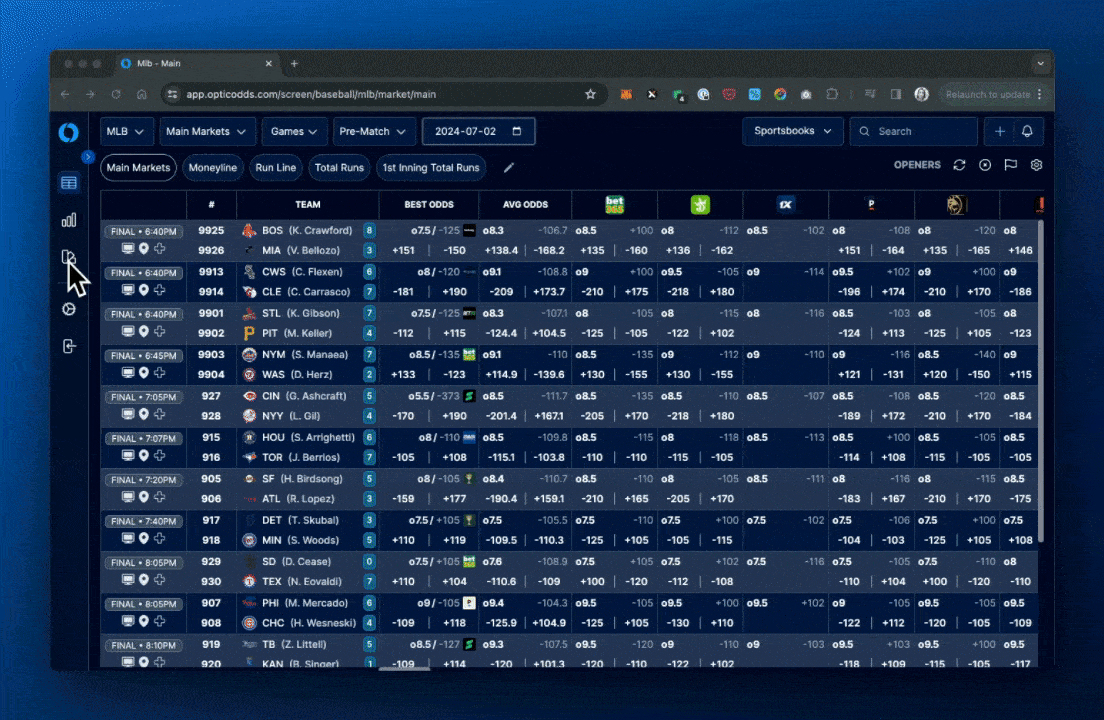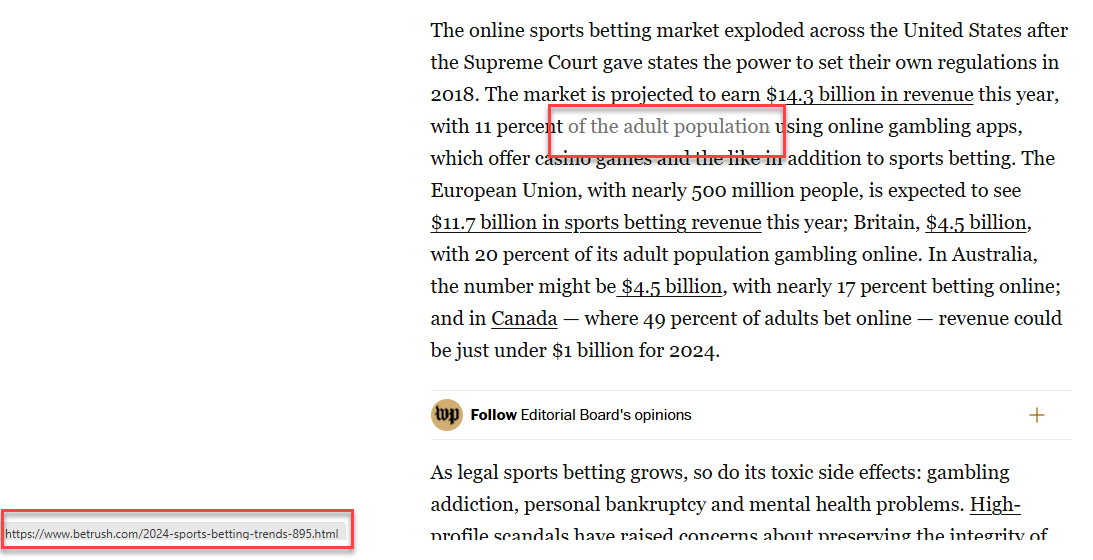DraftKings On My Mind
DraftKings defended its upcoming surcharge during its earnings call, but is there more to the decision than offsetting high tax rates?
The Bulletin Board
NEWS: Surcharge dominates DraftKings Q2 earnings call.
BEYOND the HEADLINE: Are the stated reasons for the surcharge a smokescreen?
WEEKEND CATCHUP: NYRA has another falling out; Bowyer pleads guilty in illegal bookmaking case; News from across the transom.
VIEWS: The AGA (rightfully) calls out the Washington Post for its latest sports betting editorial.
NEWS: The Massachusetts Gaming Commission is prepping for Round 2 of its discussion on limiting bettors.
AROUND the WATERCOOLER: A glimpse at e-instant online lottery games.
STRAY THOUGHTS: The surcharge is just the beginning.
SPONSOR’S MESSAGE - Sporttrade was borne out of the belief that the golden age of sports betting has yet to come. Combining proprietary technology, thoughtful design, and capital markets expertise, our platform endeavors to modernize sports betting for a more equitable, responsible, and accessible future.
Sporttrade’s newest feature, The Tape, prints all trades made on the app in real-time.
DraftKings Defends Its Proposed Surcharge
During its earnings call, DraftKings CEO Jason Robins fielded numerous questions about the company’s plans to add a surcharge to winning wagers in four high-tax states.
Robins likened the surcharge to what consumers experience in other industries, including hotels, taxis, and airlines, which I don’t think is the right analogy. Industry analyst Alun Bowden made a good point on X, noting that the desire to compare gambling decisions to other industries is misplaced, “The money won is the thing you’re buying. It’s different.”
Further, given that gambling falls into the vice category, I would point to tobacco or alcohol, which is heavily taxed by the state and federal government—there is a federal tax on cigarettes of $1.01 per pack and a $3.51 excise tax on each pack in the state of Massachusetts.
This distinction is important because, like non-smokers and non-drinkers, a non-trivial percentage of the population doesn’t care if you get lousy odds from a sportsbook and certainly doesn’t care about taxes eating into a sportsbook’s bottom line. Only smokers care that a pack of cigarettes costs $10, whereas everyone would be on board with ending hotel resort fees, whether or not they travel.
As I wrote on Friday, I have a lot of questions about this, and after the earnings call, I have another question: Does DraftKings think setting a bright line at 20% will prevent states from crossing that threshold? I ask this because Robins signaled that the surcharge was the proverbial shot across the bow:
I have yet to meet the legislature that backs down to a not-so-subtle public threat. The way to convince lawmakers is behind-the-scenes cajoling. You convince lawmakers; you don’t make demands of them.
As Joe Brennan Jr. tweeted, “He’s not very sharp re: lawmakers. It’s not their problem to figure it out. It’s operators (unfortunately), and anything else is wishful thinking. FanKings screwed the industry by going 51% GGR in NY. What did they think was going to happen? Lawmakers won’t bail them out.”
Beyond the Headline: Is the Surcharge Gaming the System
A somewhat under-the-radar thread in the surcharge discussion is whether it’s merely an added layer of protection against sharp play.
Consider the following: DraftKings assumes most of its customers won’t care (and they are probably correct), and they are now making more money from their bets.
Its only real fear is how VIP customers react to the surcharge. A regular Joe betting $200/month isn’t going to feel the sting, but a sharp or a VIP making $100,000 in bets every month will.
For simplicity’s sake, let’s assume our fictional losing VIP bets $100,000 and wins $98,000, and our fictional sharp bettor is the reverse.
The new surcharge will eat up nearly $3,000 of the losing VIP’s winnings, putting them $5,000 in the hole for the month instead of $2,000. The winning player will go from winning $2,000 to losing $1,000.
Both might look for greener pastures, but what is to stop DraftKings from increasing the losing customer’s bonuses and promotions to offset the surcharge and retain them as a customer?
Considering the current discussions around the practice of limiting bettors, a surcharge (offset by bonuses for customers a site likes) seems like a nice failsafe to have in place.
SPONSOR’S MESSAGE - Join hundreds of operators using OpticOdds for trading, risk management, and Same Game Parlay analysis.
Real-time data and trading tools for sports betting + fantasy operators. Built by those who have done it before.
Looking to join the fastest-growing data provider in the sports betting industry? Join the team now.
Weekend Catchup: NYRA Has Another Falling Out; Bowyer Pleads Guilty; Across the Transom
TwinSpires and NYRA reach an agreement: FanDuel isn’t the only ADW operator that has fallen out of favor with the New York Racing Association — after pulling races from FanDuel in early July, the two sides quickly reached a new agreement. According to US Bets, the NYRA pulled content from TwinSpires due to a contract dispute. A source told Daily Racing Form the “NYRA was seeking what amounted to a 1% hike in the source market fee for its signal, something NYRA President and CEO David O’Rourke confirmed in a statement provided to US Bets.” As was the case with FanDuel, once the NYRA pulled content, a deal was quickly reached.
Bowyer pleads guilty in bookmaking case: The illegal bookie at the center of the betting scandal involving Shohei Ohtani’s interpreter, Ippei Mizuhara, has pleaded guilty to federal criminal charges for running an illegal gambling business. Per the press release from the Department of Justice, “According to his plea agreement, Bowyer operated an unlicensed and illegal bookmaking business that focused on sports betting and violated a California law that prohibits bookmaking. Bowyer’s gambling business remained in operation for at least five years until October 2023 and at times had more than 700 bettors.”
Across the Transom:
The AGA Calls Out Washington Post; For Good Reason
*This entry has been updated to show that BetRush is a European, not an offshore, affiliate.
The American Gaming Association called out the Washington Post editorial board for a July 31 editorial that AGA President and CEO Bill Miller claims conflates the US sports betting industry and the popularity of the Olympics:
“Any industry observer, including those quoted in supporting evidence presented by the Board, would tell you the Olympics are a minor event on the sports betting calendar, and there is no indication that ad sale increases have been driven by sports betting. In fact, the article they attribute their claim to – but apparently have not read – has no mention of sports betting whatsoever, instead attributing gains to higher digital ad inventory – because of NBC Universal/Peacock’s commitment to stream every event – and increases across non-gaming related industries.”
Miller also called out the WaPo for citing an offshore affiliate website as evidence:
“Worse, the Board takes its own advice to “look overseas” quite literally, providing a link to “research” from an affiliate marketing website that directs people to illegal offshore sportsbooks. These black-market operators are surely overjoyed to receive referrals from a major American newspaper that regularly calls for more restrictions on their legal, regulated U.S. competitors. You can’t draw up a better play if you’re sitting in Curacao right now.”
The affiliate (which appears to be a European affiliate site) is a site called BetRush, which seems like an odd link for the Washington Post to include in one of its columns—unless, of course, it is a paid link, which would call into question the editorial board's journalistic integrity.
The link brings you to a page on the BetRush website that is a thin rewrite of AGA survey results, which raises the question, why didn’t the WaPo just link to the AGA research?
And since I feel like this is a link that might be deleted:
MGC To Schedule Next Discussion on Limiting
The Massachusetts Gaming Commission is expected to schedule its next meeting on the inflammatory topic of sportsbooks limiting bettors this week. Most of the state’s licensed sports betting operators skipped the first roundtable discussion in May (only a representative from Bally’s Bet appeared).
What the next meeting will look like, and more importantly, who will participate, is still unclear.
The MGC was none too pleased with being stood up, evidenced by MGC Commissioner Nakisha Skinner’s statement: “I’m not interested in having another roundtable just to have the operators come before us and say they can’t talk.”
Instead, Skinner would like it to be an official public meeting.
Operators have told the MGC (per Crystal Beauchemin, the business manager of the MGC’s Sports Wagering Division) they are only interested in participating in a discussion sans player and responsible gambling advocates. They want it to be operator-only.
This hot-button issue could become even hotter, as player advocates are becoming a far more influential group following the creation of the American Bettor’s Voice:
SPONSOR’S MESSAGE - Underdog: the most innovative company in sports gaming.
At Underdog we use our own tech stack to create the industry’s most popular games, designing products specifically for the American sports fan.
Join us as we build the future of sports gaming.
Visit: https://underdogfantasy.com/careers
Around the Watercooler
Social media conversations, rumors, and gossip.
Have you ever wondered what an online instant win lottery ticket looks like? Some very much look like slots, but others, including those offered by lottery courier Lotto.com, are, well, you can just see for yourself here:
Stray Thoughts
Like the prohibition on college player prop bets, the conversation around the DraftKings’ surcharge needs to pan out and look at the bigger picture. It’s not that the surcharge itself is a seismic shift; It’s what it leads to.
What is to stop DraftKings or other books from adding a surcharge to offset the federal excise tax (as is the case with DK’s rationale, force the federal government’s hand to repeal it)? Or, some other surcharge when marketing or some other restrictions are put in place?
It’s a slippery slope that leads to nowhere good.
As I recently wrote in a previous Stray Thoughts entry:
“The industry is at a crossroads, and the US gambling environment, especially online, is about to undergo a change. It won’t be sudden, and it might be hard to see in real time, but little by little, things will change. The changes will be subtle, but over time, and in aggregate, they will be dramatic.”







